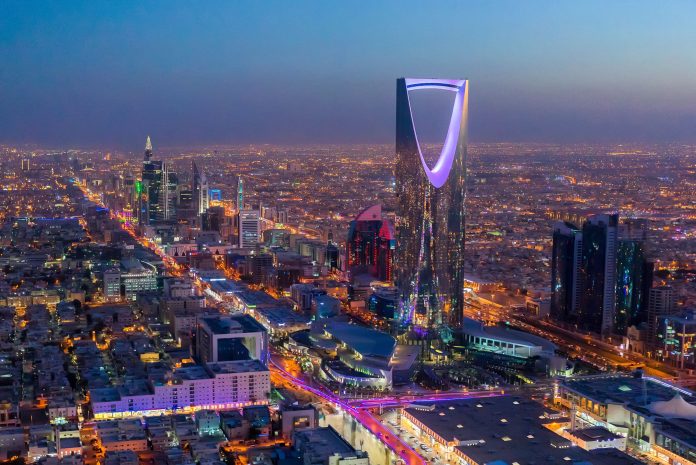Mirna Fahmy – Diplomatic Inside
Discarding its fanatic traditions, Saudi Arabia is undergoing significant transformation, embracing a more open and inclusive approach to its policies and culture.
The latest fashion show of the Lebanese couturier Elie Saab that was taking place in Riyadh, the capital city of Saudi Arabia, has squashed the opinions and the social media with shocks and surprises of how the extreme conservative country is altering its cultural policies.
Celebrating the 45th anniversary of his eponymous brand, Saab launched his fashion show in Riyadh with the title “The 1001 Seasons of Elie Saab,” showcasing 300 stunning ensembles from the fashion house. Introduced by Halle Berry, the show was also accompanied by a variety of musical performances between Arab celebrities like Nancy Ajram and Amr Diab and Hollywood celebrities such as Jennifer Lopez (JLO), Camila Cabello, and Celine Dion.
The spotlights were mainly on the Hollywood celebrities, as their existence was unique, appealing to many views and conversations. For Celine Dion, it was her strikeback after being absent for so long from the industry as she was combating a serious illness that was straining her movement for a time.
Camila Cabello shifted some words from her “Havana” song to Saudi na na na na, demonstrating how delighted she is to be performing in Saudi Arabia.
Due to Jennifer Lopez’s provocative attire and performance, there have been numerous debates concerning Saudi Arabia’s relaxation of its cultural and religious prohibitions on her performing such a concert. It’s not the first time JLO has performed in an Arabic-speaking nation without causing a stir with her attire. Mohamed Al-Kasi, a Moroccan attorney, sued Lopez and the leader of the “Maghreb Cultures” organisation in 2015 on grounds of “violating public modesty” due to Lopez’s revealing attire and performance at the Mawazine Festival in Morocco, which were perceived as “sexually suggestive.”
The same happened to her in Egypt in 2019 after she performed in the North Coast. An Egyptian lawyer called Samir Sabry filed a lawsuit and a report to the Attorney General against JLO for appearing at the party in “bold” clothes, which some described.
Who is behind the entertainment industry in Saudi Arabia and the MENA region?
The 1001 Seasons of Elie Saab is part of Riyadh Season that was launched in 2019 moderated by the Saudi General Entertainment Authority’s (GEA) Chairman Turki Al-Shikh as part of the Kingdom’s strategy to transform it into a global tourist destination. This year, the fifth season presented more than 100 daily events in 12 entertainment areas, including artistic and cultural performances, attracting six million, as he stated on his Facebook account, visitors from all over the world.
Turki Al-Shikh has been known in both the Saudi media and the Egyptian media for his sponsorships in both countries in the entertainment and sports fields. Turki Al-Shikh has been accused by many Egyptians that he is altering through his vicious funds the Egyptian cinema to go with the Saudi audience and themes like what was agitated on the Egyptian film “Al Nono.” Turki Al-Shikh has narrated in a video on his social media accounts that the plot would revolve around an Egyptian fraudster who carries out two fraud operations in Saudi Arabia, the first of which is during a computer games tournament, and the second of which the victims are pilgrims and Umrah performers. Many considered the plot evidence of Al-Sheikh’s bad intentions to “distort Egyptians” in his production works and presented them in a negative light.
Also, this year, Turki Al-Shikh announced on his Facebook account that he will establish a film box known as “Big Time” to enhance film production in the Arab world starring Egyptian actors and actresses. In 2019, Turki Al-Shikh signed an agreement with an institution affiliated with Egyptian media regarding many entertainment aspects.
Egyptians feared that Egypt, which was once the “Hollywood” of the Middle East and the Arab World for over a century, would be shifted to Saudi Arabia because of the sheer funds.
In the Egyptian sports field, Turki Al-Shikh used to own the Egyptian Football Club, the Pyramids Club (Al-Ahram). He even donated to one of the famous Egyptian clubs, Al-Ahly Club, with a total of only 119.1 million pounds, which is “4.85 million dollars and 7 million riyals. He has sponsored many football matches between the Egyptian teams on the Saudi grounds.
Intersection with Cairo’s International Film Festival:
On the same day of Saab’s fashion show, it was the opening of the 45th round of Cairo’s International Film Festival (CIFF) in Egypt. It is the oldest annually running film festival in the Middle East and Africa. It was noted that many Egyptian stars were absent at Cairo’s opening as they were attending Saab’s fashion show in Riyadh. Rage has spanned the social media among Egyptians, indicating that the date of Saab’s show was intentionally on the day of the opening of Cairo’s annual film festival to divert all the attention of the media, especially the Arabic, towards what is happening in Riyadh.
The Egyptian actor and the festival head, Hussein Fahmy, urged all the attending stars to wear a small Palestinian badge or a Palestinian scarf. This year’s edition was distinguished by its support for the Palestinian cause and Lebanon, in light of the war that Israel has been waging on the Gaza Strip for more than a year and its war on Lebanon, which has entered its second month.
The opening ceremony began with a Palestinian show in solidarity with the Palestinian cause, whereas the dancers from Gaza performed the song “I Am My Blood is Palestinian” to the tune of the Dabkeh while wearing the Palestinian scarf. At the end of the show, Fahmy appeared in the middle of the Palestinian band, expressing his and the festival’s solidarity with Gaza.
No more extremist ideologies
Elie Saab’s concert fashion show isn’t the only one that grabbed the attention, but also the “Bikini Fashion Show” in May of this year. The country’s openness has gathered both jollity on Saudi Arabia’s cultural progress and criticism as well because Saudi Arabia is the home land of Islamic religion preacher and founder Muhammad. According to the religion’s teachings, society should be modest and conservative in their way of living. Since 2016, Saudi Arabia has been progressively opening its culture with significant advancements following the introduction of Vision 2030 by Crown Prince Mohammed bin Salman. This initiative aims to diversify the economy and reduce dependence on oil by promoting tourism and cultural activities.
The Saudi government has actively worked to expand the entertainment sector. This includes reopening cinemas in 2018 after a nearly four-decade closure, allowing concerts, and establishing events like the MDL Beast music festival in December 2019, which attracted significant international attention.
This Ministry of Culture was created in 2018 to oversee cultural transformation efforts, aiming to nurture creativity and promote Saudi culture both locally and internationally.
Amid this progress, women’s rights were remarkable. The lifting of the ban on women driving in 2017 and changes in dress codes reflect broader societal shifts that have significantly improved women’s rights. These reforms are part of a larger strategy to empower women and enhance their participation in various sectors.
The country started opening bars and discos in many cities in Saudi Arabia when they were banned for decades. However, it is clear that these bars wouldn’t be opened in the holy Islamic religious cities like Makkah and Madinah. In reference to travellers’ stories on social media, females are free to either or not cover their heads, and they don’t receive annoyance as much as before.
What has been controlling the societal norms of Saudi Arabia was the Wahhabism ideology. Wahhabism is a conservative reform movement within Sunni Islam, founded by the 18th-century scholar Muhammad ibn Abd al-Wahhab in Saudi Arabia. This movement emphasises a strict interpretation of Islamic texts, advocating for a return to what its followers consider the “pure” form of Islam as practised by the early generations of Muslims, known as the Salaf. This ideology has travelled to many neighbouring countries, such as Egypt, Tunisia, Yemen, Libya, Kuwait, Sudan, Nigeria, Pakistan, Afghanistan, Indonesia, and Malaysia.
Mohammed bin Salman, who was appointed crown prince of Saudi Arabia in 2016, promised to restore the country to the “moderate Islam” that hard-liners had taken over in 1979 and launched a vigorous campaign against radical clerics. Later that year, he declared at a forum, “We will not waste another 30 years of our lives dealing with extremist ideas.” “Today, we will destroy them.”


